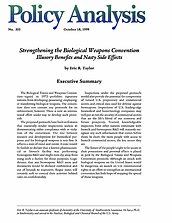The proposed protocols have built-in features that essentially render inspections useless in demonstrating either compliance with or violation of the convention. The line between research and development for biomedical purposes and for biological weapons is very fine. It reflects a state of mind and intent. A state would be foolish to declare that a known pharmaceutical or biotech facility was performing bioweapons R&D and might even shy away from using such a facility for those purposes. Logic dictates that any bioweapons R&D areas and documents would be declared confidential and out of bounds to inspectors. Rogue states will certainly seek to conceal their activities behind rules on confidentiality.
Inspections under the proposed protocols would also provide the potential for compromise of valued U.S. proprietary and commercial secrets and critical data used for defense against bioweapons. Inspections of U.S. leading-edge biomedical and biotechnology companies may well put at risk the security of commercial secrets that are the life’s blood of our economy and future prosperity. Trained, knowledgeable inspectors from other nations conversant with biotech and bioweapons R&D will instantly recognize any such information that comes before them. In short, the more people with access to biotech commercial secrets, the less secure they are.
The future of the people’s right to be secure in their possessions and personal effects is placed in peril by the Biological Toxins and Weapons Convention protocols. Although an attack with biological weapons on the United States would be dangerous, an assault on U.S. constitutional rights in an effort to strengthen an international convention has little hope of stopping the spread of those weapons.

